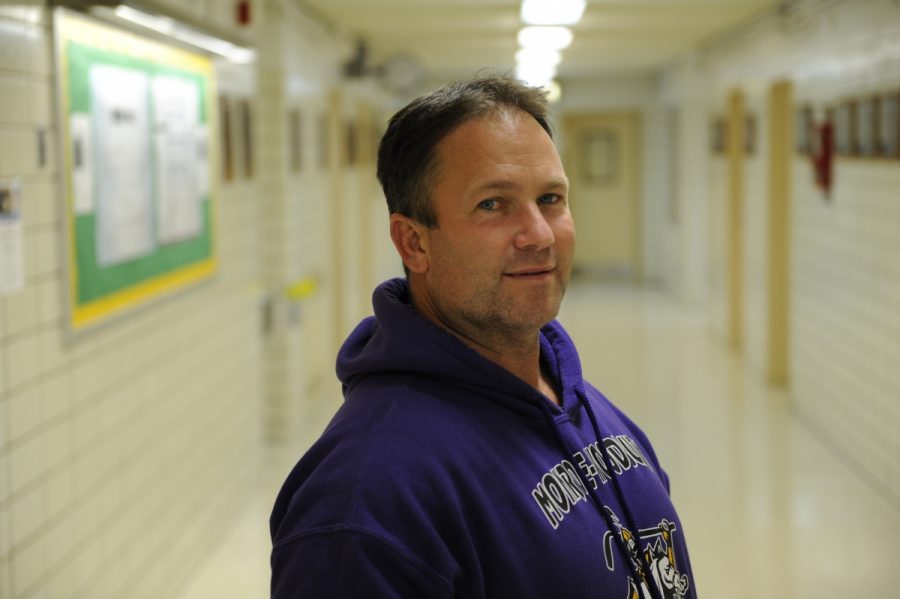Without a Clear Message, Anthem Protesters Fail to Create Lasting Change
Mr. O’Hara, pictured above, argues that the anthem protests have divided team locker rooms.
There is widespread racial injustice taking place in our country today. Plain and simple. Many have tried to spread awareness about these injustices through widespread protests.
Members of the National Football League (NFL) have protested this peacefully by kneeling and raising fists while the national anthem plays before NFL games. But, as with any other protest, this has caused controversy in our society. Football is widely seen as America’s game, and the sport has a nationalistic and patriotic undercurrent. Therefore, some Americans, usually conservative leaning, see flag kneeling as an assault on American culture, leading to further polarization within our already divided society.
Speaking to his base at a massive Alabama rally in late September, President Trump said, “Wouldn’t you love to see one of these NFL owners, when somebody disrespects our flag, to say, ‘Get that son of a (expletive) off the field right now. Out. He’s fired. He’s fired!’”
These inflammatory and divisive comments by the President have caused an increase in the number of anthem protests, and players showing solidarity with those protesting. For example, during Week 3 of the NFL season, just days after Trump’s remarks, almost all the teams playing either linked arms, kneeled, or stayed in the locker room while the anthem played, in a symbol of unity. Even some NFL owners, including Shahid Khan,who donated one million dollars to President Trump’s inaugural committee, interlocked arms with their players to show solidarity with players protesting. Because these acts of defiance were a direct response to Trump’s rhetoric, the anthem protests no longer have a unified message, which originally was trying to create social and political change in our country.
“While some players agree with the ones who are making a stand, other team members are infuriated. This causes team division and team dissension within the locker room.”
Every American has the right to peacefully protest any cause they see fit; this tolerance is one of the ideals America was founded on and why it is a successful nation today. However, the weekly anthem protests held by NFL players have lacked a message and identity, which have made these protests ineffective. Most Americans know that some NFL players are now protesting from the sidelines for the anthem, but nobody seems to know why that is.
It remains a mystery whether these NFL players are protesting for reform, for increased awareness, against Trump, police brutality, or a different host of issues. Colin Kaepernick said in a postgame interview that he knelt because he was “not going to stand up to show pride in a flag for a country that oppresses black people and people of color…There are bodies in the street and people getting paid leave and getting away with murder.”
Brandon Marshall, linebacker for the Denver Broncos, stated in a separate post game interview, “The message is I’m against social injustice… I’m not against the military or police or America at all,” he said. While these messages are not conflicting, they certainly are not unifying, thus making the protest lack a significant impact on social, and, more importantly, our political climate.
William O’Hara, a physical education teacher at Bronx Science, believes that the anthem protests have caused more of a division than a unifying force, arguing that, “it doesn’t send a unified message to the league or to the United States at all.” He instead believes that the complete opposite effect is taking place. “While some players agree with the ones who are making a stand, other team members are infuriated. This causes team division and team dissension within the locker room,” he said.
If NFL players are indeed serious about combatting America’s social injustices, there should be a more concerted and more consistent effort from each player who kneels to take an action to halt that injustice.
For example, Colin Kaepernick didn’t vote in the past presidential election. While there isn’t any problem with Colin Kaepernick kneeling for the anthem, there is no excuse for him not to vote in a presidential election that clearly had an impact on how his values are represented in government.
These players have a real platform to voice their concerns about any issues that concern them. Before an NFL game, all the cameras are on the player’s movements, and people will take note if someone kneels for the national anthem. Therefore, it is vital for these players to clearly portray their unifying message. Then, these protests can finally be more substantial, and less symbolic.
Adam Israelevitz is an Editor-in-Chief for ‘The Science Survey’ and an Groups Section Staff Reporter for ‘The Observatory.’ As an Israeli citizen...











